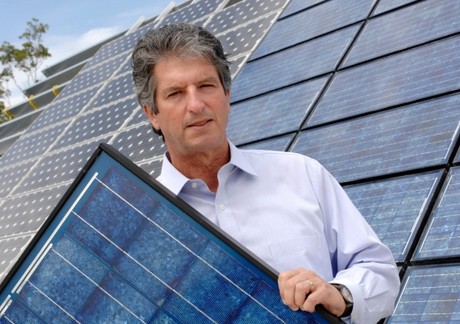Australian solar expert wins Global Energy Prize

Solar energy pioneer Scientia Professor Martin Green has become the first Australian to win a Global Energy Prize for his research, development and educational activities in the field of photovoltaics.
Established in Russia in 2003, the annual Global Energy Prize honours outstanding achievements in research and technology that are addressing the world’s pressing energy challenges. It is presented each year by the President of the Russian Federation.
Professor Green, who is Director of the Australian Centre for Advanced Photovoltaics at UNSW, was honoured for having revolutionised the efficiency and costs of solar photovoltaics, making this now the lowest cost option for bulk electricity supply. He shares this year’s prize and RUB39 million ($820,000) in prize money with Russian scientist Sergey Alekseenko, an expert in thermal power engineering.
Professor Green is a specialist in both monocrystalline and polycrystalline silicon solar cells, with the research group he founded at UNSW Engineering said to be the largest and best-known university-based photovoltaic research group in the world. The enormous cost reductions in photovoltaic solar systems in recent years are directly related to his scientific efforts, largely through the work of his students in establishing manufacturing centres in Asia.
Professor Green’s achievements stretch across decades. In 1989, his team supplied the solar cells for the first photovoltaic system with an energy conversion efficiency of 20%. In 2014, he headed the development team that first demonstrated the conversion of sunlight into electricity with an energy conversion efficiency of 40%.
He also invented PERC solar cells — solar cells with a passivated emitter and rear surface — which accounted for more than 24% of the world’s silicon cell manufacturing capacity at the end of 2017. The use of such solar cells is predicted to save at least $750 million in power production costs in Australia alone over the next decade.
“As a world-leading researcher in photovoltaics, Martin has delivered truly transformational outcomes in renewable energy for more than three decades,” said UNSW President and Vice-Chancellor Professor Ian Jacobs.
“Martin is a highly deserving recipient of this global prize and we warmly congratulate him. His fundamental and applied research has transformed the global energy sector and will continue to produce major economic and social benefits, both in Australia and worldwide.”
“The global impact of the work of Martin and his research team has been profound,” added UNSW Dean of Engineering Professor Mark Hoffman. “They have created the highest efficiency solar cells using techniques that have made them accessible to the world through commercialisation. And all of this has been achieved in Australia.”
Professor Green is the co-inventor of the laser-doped, selective emitter solar cell, used in solar panels which were sold by Suntech between 2009 and 2011. He is also a pioneer in the area of perovskite photocells, which he believes could be used as a supplement to silicon solar panels, with a combination of the two materials potentially able to further reduce the cost of electricity. He is the winner of many scientific and industry awards and the holder of many patents, plus the author of eight books and more than 750 publications.
Professor Green and his fellow winner were selected from 44 contenders from 14 countries by a committee of leading scientists, beating finalists including businessman and engineer Elon Musk. The prize ceremony will be conducted as part of Russian Energy Week, to be held from 3–6 October in Moscow.
Australia Post sets 2030 emissions targets
The targets focus on reducing the more challenging carbon emissions in Australia Post's...
$320m to power Western Sydney International Airport
Endeavour Energy delivers the first major stage of electricity supply for the Western Sydney...
High-integrity carbon scale to be discussed at Climate Action Week
Leaders across engineered and nature-based carbon removal will come together for a discussion...









